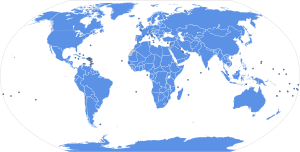Suveren dövlət: Redaktələr arasındakı fərq
Naviqasiyaya keç
Axtarışa keç
Silinən məzmun Əlavə edilmiş məzmun
Redaktənin izahı yoxdur |
Redaktənin izahı yoxdur |
||
| Sətir 1: | Sətir 1: | ||
[[Şəkil:United Nations Members.svg|thumb|upright=1.35|[[Birləşmiş Millətlər Təşkilatı]]nın ({{comment|abr.|abreviatura}} ''[[BMT]]'') üzv ölkələri. Bu ölkələrin hamısı suveren dövlətlərdir, ancaq |
[[Şəkil:United Nations Members.svg|thumb|upright=1.35|[[Birləşmiş Millətlər Təşkilatı]]nın ({{comment|abr.|abreviatura}} ''[[BMT]]'') üzv ölkələri. Bu ölkələrin hamısı suveren dövlətlərdir, ancaq suveren bir dövlət olmaq üçün [[Birləşmiş Millətlər Təşkilatı|BMT]] üzvü olmağa ehtiyac yoxdur.]] |
||
'''Suveren dövlət''' — [[beynəlxalq hüquq]]da [[ali hakimiyyət]]i təmsil edən, öz dövlətinin [[Daxili siyasət|daxili]] və [[xarici siyasət]]ində tamamilə müstəqil olan, başqa dövlətin hakimiyyətindən asılı olmayan və hansısa bir coğrafi ərazidə [[Suverenlik|suverenliyi]] olan [[dövlət]]. [[Beynəlxalq hüquq]] suveren dövlətləri daimi [[əhali]]yə sahib olmaqla, müəyyən bir ərazisi olmaqla, ali və tək hökuməti olmaqla və [[Beynəlxalq münasibətlər|digər suveren dövlətlərlə münasibət]] qurmağa gücü olmaqla xarakterize edir.<ref>{{Cite book|title=International law|first1=Malkolm Neytan|last1=Şau|year=2003|publisher=Cambridge University Press|page=178|quote=Article 1 of the Montevideo Convention on Rights and Duties of States, 1 lays down the most widely accepted formulation of the criteria of statehood in international law. It note that the state as an international person should possess the following qualifications: '(a) a permanent population; (b) a defined territory; (c) government; and (d) capacity to enter into relations with other states'}}</ref><ref>{{Cite book|title=Perspectives on international law|first=Nandasiri|last=Casentuliyana|publisher=Kluwer Law International|year=1995|page=20|quote=So far as States are concerned, the traditional definitions provided for in the Montevideo Convention remain generally accepted.}}</ref> Həmçinin, suveren bir dövlət başqa bir dövlətdən nə asılı, nə də həmin dövlətə tabe olmalıdır.<ref>{{Cite book|title=Elements of international law: with a sketch of the history of the science|first1=Henri |last1=Uiton|publisher=Carey, Lea & Blanchard |year=1836|page=51|quote=A sovereign state is generally defined to be any nation or people, whatever may be the form of its internal constitution, which governs itself independently of foreign powers.}}</ref><ref>{{Citation|title=sovereign|work=The American Heritage Dictionary of the English Language|edition=4th|publisher=Houghton Mifflin Company|year=2004|accessdate=21 fevral 2010|url=http://dictionary.reference.com/browse/sovereign|quote=adj. 1. Self-governing; independent: a sovereign state.}}</ref><ref>{{Citation|title=sovereign|work=The [[New Oxford American Dictionary]]|edition=2nd|year=2005|publisher=Oxford University Press|place=Oxford|isbn=0-19-517077-6|quote=adjective ... [ attrib. ] (of a nation or state) fully independent and determining its own affairs.}}</ref> |
'''Suveren dövlət''' — [[beynəlxalq hüquq]]da [[ali hakimiyyət]]i təmsil edən, öz dövlətinin [[Daxili siyasət|daxili]] və [[xarici siyasət]]ində tamamilə müstəqil olan, başqa dövlətin hakimiyyətindən asılı olmayan və hansısa bir coğrafi ərazidə [[Suverenlik|suverenliyi]] olan [[dövlət]]. [[Beynəlxalq hüquq]] suveren dövlətləri daimi [[əhali]]yə sahib olmaqla, müəyyən bir ərazisi olmaqla, ali və tək hökuməti olmaqla və [[Beynəlxalq münasibətlər|digər suveren dövlətlərlə münasibət]] qurmağa gücü olmaqla xarakterize edir.<ref>{{Cite book|title=International law|first1=Malkolm Neytan|last1=Şau|year=2003|publisher=Cambridge University Press|page=178|quote=Article 1 of the Montevideo Convention on Rights and Duties of States, 1 lays down the most widely accepted formulation of the criteria of statehood in international law. It note that the state as an international person should possess the following qualifications: '(a) a permanent population; (b) a defined territory; (c) government; and (d) capacity to enter into relations with other states'}}</ref><ref>{{Cite book|title=Perspectives on international law|first=Nandasiri|last=Casentuliyana|publisher=Kluwer Law International|year=1995|page=20|quote=So far as States are concerned, the traditional definitions provided for in the Montevideo Convention remain generally accepted.}}</ref> Həmçinin, suveren bir dövlət başqa bir dövlətdən nə asılı, nə də həmin dövlətə tabe olmalıdır.<ref>{{Cite book|title=Elements of international law: with a sketch of the history of the science|first1=Henri |last1=Uiton|publisher=Carey, Lea & Blanchard |year=1836|page=51|quote=A sovereign state is generally defined to be any nation or people, whatever may be the form of its internal constitution, which governs itself independently of foreign powers.}}</ref><ref>{{Citation|title=sovereign|work=The American Heritage Dictionary of the English Language|edition=4th|publisher=Houghton Mifflin Company|year=2004|accessdate=21 fevral 2010|url=http://dictionary.reference.com/browse/sovereign|quote=adj. 1. Self-governing; independent: a sovereign state.}}</ref><ref>{{Citation|title=sovereign|work=The [[New Oxford American Dictionary]]|edition=2nd|year=2005|publisher=Oxford University Press|place=Oxford|isbn=0-19-517077-6|quote=adjective ... [ attrib. ] (of a nation or state) fully independent and determining its own affairs.}}</ref> |
||
05:32, 23 noyabr 2020 tarixindəki versiya

Suveren dövlət — beynəlxalq hüquqda ali hakimiyyəti təmsil edən, öz dövlətinin daxili və xarici siyasətində tamamilə müstəqil olan, başqa dövlətin hakimiyyətindən asılı olmayan və hansısa bir coğrafi ərazidə suverenliyi olan dövlət. Beynəlxalq hüquq suveren dövlətləri daimi əhaliyə sahib olmaqla, müəyyən bir ərazisi olmaqla, ali və tək hökuməti olmaqla və digər suveren dövlətlərlə münasibət qurmağa gücü olmaqla xarakterize edir.[1][2] Həmçinin, suveren bir dövlət başqa bir dövlətdən nə asılı, nə də həmin dövlətə tabe olmalıdır.[3][4][5]
Həmçinin bax
İstinadlar
- ↑ Şau, Malkolm Neytan. International law. Cambridge University Press. 2003. səh. 178.
Article 1 of the Montevideo Convention on Rights and Duties of States, 1 lays down the most widely accepted formulation of the criteria of statehood in international law. It note that the state as an international person should possess the following qualifications: '(a) a permanent population; (b) a defined territory; (c) government; and (d) capacity to enter into relations with other states'
- ↑ Casentuliyana, Nandasiri. Perspectives on international law. Kluwer Law International. 1995. səh. 20.
So far as States are concerned, the traditional definitions provided for in the Montevideo Convention remain generally accepted.
- ↑ Uiton, Henri. Elements of international law: with a sketch of the history of the science. Carey, Lea & Blanchard. 1836. səh. 51.
A sovereign state is generally defined to be any nation or people, whatever may be the form of its internal constitution, which governs itself independently of foreign powers.
- ↑ "sovereign", The American Heritage Dictionary of the English Language (4th), Houghton Mifflin Company, 2004, İstifadə tarixi: 21 fevral 2010,
adj. 1. Self-governing; independent: a sovereign state.
- ↑ "sovereign", The New Oxford American Dictionary (2nd), Oxford: Oxford University Press, 2005, ISBN 0-19-517077-6,
adjective ... [ attrib. ] (of a nation or state) fully independent and determining its own affairs.